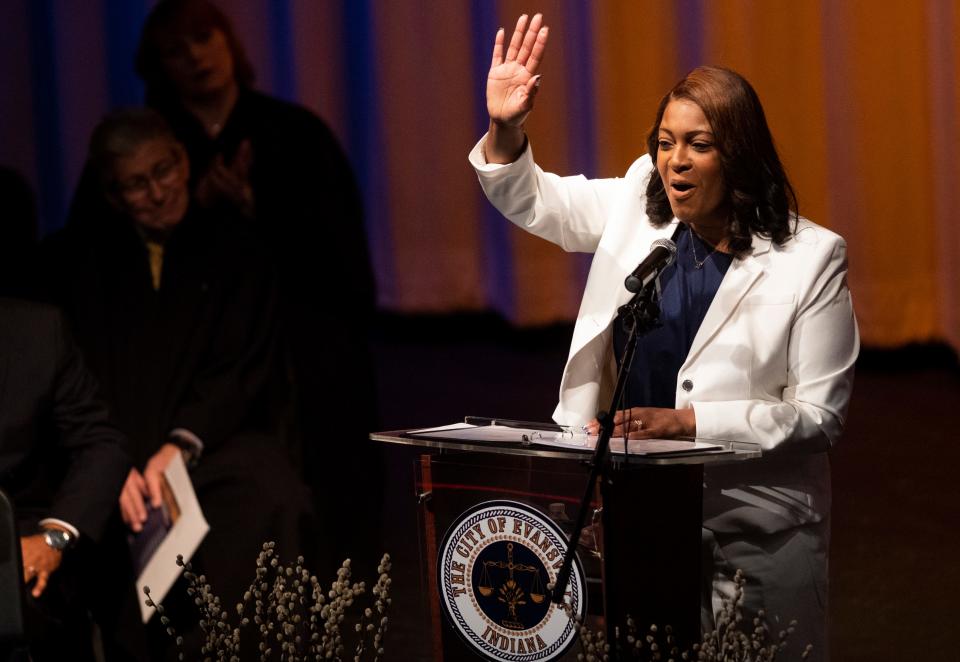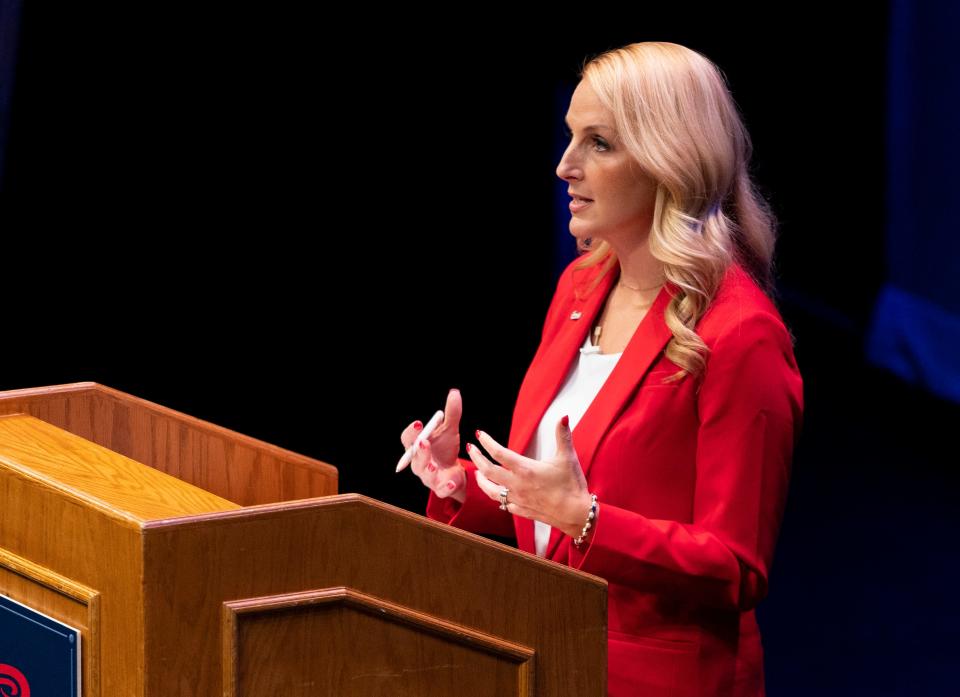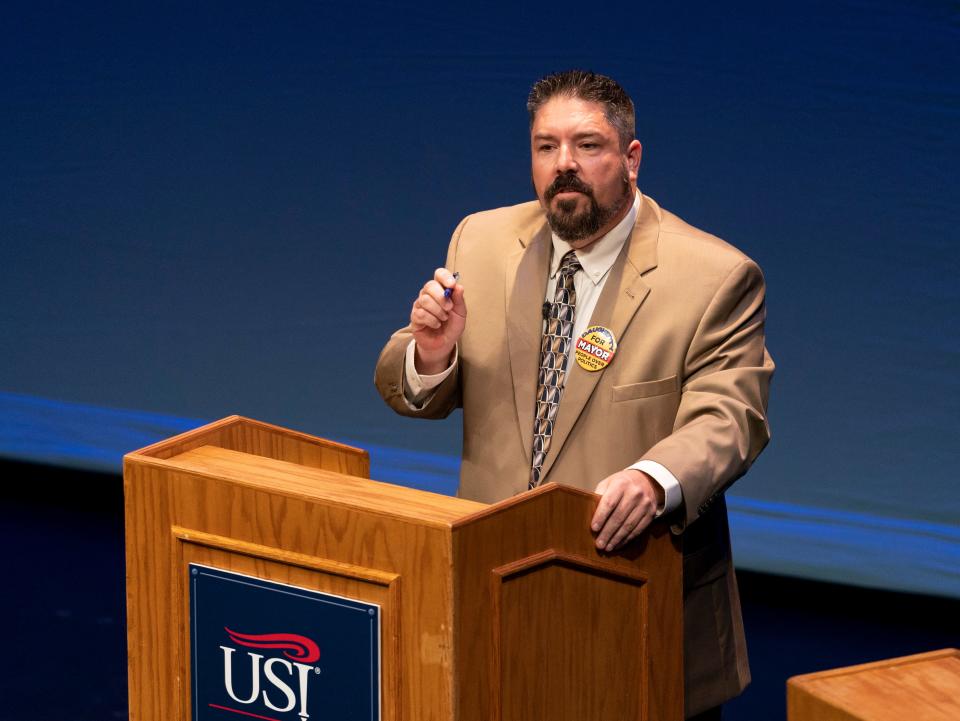Evansville mayoral candidates file reports painting very different pictures
EVANSVILLE — As clinical and sometimes even boring as they may look, campaign fundraising reports filed after the campaign is over tell stories bespeaking joy and heartbreak.
Win, as Stephanie Terry did running for mayor of Evansville, and your post-election report is replete with expenses that paid for a party. Maybe it shows donations to help retire a debt or launch a political fund formidable enough to scare potential challengers. The year-end report Democrat Terry filed Tuesday contains page after page of donations made weeks after she defeated Republican Natalie Rascher and Libertarian Michael Daugherty on Nov. 7.
More: Evansville Mayor Stephanie Terry, city officials sworn in during inauguration ceremony
Now navigating her first month in the mayor’s office, Terry reported hauling in more than $93,000 after she was declared the winner.
During the reporting period of Nov. 13 to Dec. 31, 2023, Terry raised $93,340.06. Left of that is $76,110.10.
Big-dollar donations? The new mayor got some.

Connie Robinson, a former city councilor and a member of Terry’s transition team, donated $2,500 just prior to the end of the year.
Another member of the new mayor's transition team, Rev. Adrian Brooks, topped that with a $3,750 donation a day later.
Todd Robertson, the city’s executive director of the Department of Transportation, donated $1,250 to Terry. Robertson had been in his position with the city for 12 years prior to Terry’s election win.
Terry retained Robertson in his role.
ActBlue also shows up in Terry’s donations many times, similar to other finance reporting periods.
Terry’s largest expenditures for this reporting period were marketing with Idea39, LLC, out of Detroit, Michigan at around $5,000.
More: Community packs Bosse High School for swearing in of Stephanie Terry, city officials
It's a different story when you lose
Rascher's annual report, which came in hours after the noon Wednesday deadline, covers the entire year of 2023. The delinquent report records five contributions by individuals on Election Day or the day after and none from corporations or political action committees.
Rascher's paperwork does report she received $18,450 in donations from "other organizations" on Election Day or the day after, part of what appears to be a late surge of money from Republican politicians that actually began a week earlier. On Oct. 30, Indiana Gov. Eric Holcomb pumped $10,000 into Rascher's campaign. Contributions reported on Election Day include $2,000 from 8th District Congressman Larry Bucshon and $1,000 from Lt. Gov. Suzanne Crouch, a Vanderburgh County resident and a candidate for governor.

Rascher also reported receiving $10,000 from Heritage Petroleum and $3,000 from Head's Electric, both of Evansville, on Election Day. Three contributions totaling $2,450 were reported as received the day after the election. And that was it.
As is the case with most candidates who lose, the post-election expenditures on Rascher's year-end campaign finance report tell a story that conjures up images of cleaning up, putting away chairs and saying goodnight. There were no party expenses − just banking fees, reimbursement of event costs and payment of bills for social media, technology, consulting and printing of election day handouts.
Rascher's final expenditure of the year was $30 in banking fees paid to Old National Bank on Dec. 15.
In the end, Rascher reported raising just over $1 million and spending all but $8,328.40 of it for a campaign that garnered just under 40% of the vote.
Libertarian candidate Daugherty spent $35K of own money
Sometimes an unsuccessful candidate's post-election fundraising report tells a story of hurt that goes beyond losing the election.

The report Daugherty filed on Wednesday — just in time to beat the state's noon deadline — lays bare just how much this campaign cost him. Daugherty spent more than $35,000 of his own money in what his filing paperwork calls a "loan." It's money Daugherty acknowledged during the campaign that he probably wouldn't get back unless he won the election.
The fundraising reports filed Tuesday and Wednesday may be the denouement of the 2023 campaign, but there will be many more such reports filed in 2024. In Indiana, filing for this year's candidates began Jan. 10 and ends Feb. 9. Election Day is Nov. 5.
This article originally appeared on Evansville Courier & Press: Evansville mayoral candidates file reports painting very different pictures

